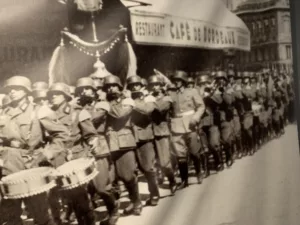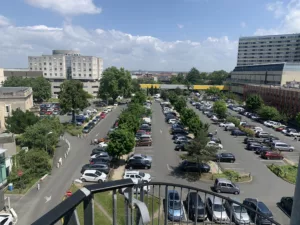Both writers and readers are fascinated, not only by the meaning of words, but often by their origins.
‘Comfort’ tends to be associated with ease, as in, I prefer to sit in a comfortable chair. The word originated from the Latin, comfort and the French confort. The Latin included the sense of ‘to strengthen’, and the French, the wider meaning which included ease and comforting. Context is everything. When I go to a friend for comfort, I may be asking for sympathy. I may want more – strength, an ability to cope and thereby carry on.
 German troops enter Bordeaux in June 1940
German troops enter Bordeaux in June 1940
The word ‘harrowing’, has an interesting etymology. A harrow is a farming implement that’s used to break up the ground. Harrowing tends to mean anguished as in – I’ve had a harrowing experience. We tend to use it more casually. I’ve had a harrowing day when we mean, it’s been unusually difficult.
Until recently, I confused harrowing with harrying, which has a different meaning entirely.
 View of Bordeaux from top of Hôpital Pellegrin
View of Bordeaux from top of Hôpital Pellegrin
In Normal Women, Philippa Gregory describes the effect of the invasion of the Normans on women during the eleventh century. She describes the ‘harrying of the north’. The north in this context is present day Yorkshire, Durham, some of east Lancashire and Cumberland. William the Conquerer invaded in 1066 to claim the throne from KIng Harold Godwinson. The King was defeated on 14th October at what we know as the battle of Hastings. There followed battles all over what is now England and Wales. In the north, the Danes retreated and some of the rebel leaders fled into Scotland.
William, allegedly, took his revenge on those who remained in what became know as the ‘harrying of the north.’ To harry comes from the Old English word ‘hergian,’ meaning to make raids, wage war. It’s also derived from the Middle English word ‘harien’, which means to plunder, ravage. William, allegedly, did more than that. He took revenge on the rebels by destroying village after village. Men, women and children were murdered, their homes and crops destroyed. Historians argue as to whether William and his men carried out these atrocities. Archaeology suggests that large parts of northern England were laid waste at that time.
By whom is disputed.
 Monument aux Girondins, Bordeaux
Monument aux Girondins, Bordeaux
Context again, shows the meaning. In this country we may feel harried by specific stresses of modern life – poverty, unemployment, long-term illness – the rush on the tube, on trains and motorways. Those difficulties are bad enough, but they’re not war. Whoever harried the north of England, it’s not happening now. Our country is not being laid waste. If it were, we would call it genocide.
Writing and reading encourages me to reflect on the specific meaning of words, to question whether the word is accurate or applicable.
References: Photo: German troops enter Bordeaux. I took it at an exhibition in Bordeaux about the end of WW2. Jews became the target of German activity when they occupied the city. A Polish Jew, Israel Leizer Karp was one of the first to be executed. August 1940. He was accused of assaulting a German soldier on the above parade. French witnesses disputed it. Photo I took from top floor of Hôpital Pellegrin while my husband had minor emergency dental treatment. Monument aux Girondins, Bordeaux. Permission: Olivier Aumage. CC-BY-SA-2.O-Fr. The Girondins were heroes of the French revolution in 1789. In 1793, many of them were executed in the Reign of Terror which followed. A beautiful memorial.
During our holiday in Bordeaux, I read Did you see Melody – Sophie Hannah. I left it on the hotel bookshelves because it was a good read, and also because it’s set in America and many Americans stay at the hotel. Back at home I finished The Best of Everything – Kit de Waal, which I recommend. I began In the Blood – Anna Fodorova. It’s a slow read for several reasons, but interesting. A young woman with Jewish ancestry tries to trace relatives who survived the holocaust. Her mother refuses to give her information about what happened to her family. The acknowledgements at the front, thank her 2 writing groups. The National Writers’ Conference held at the University of Birmingham on 31st May, celebrated the writing support many of us get via small groups of people. I’ve been part of Novelink for at least 10 years and Tindal Street Fiction Group since 2016. I’m also part of poetry support groups. Probably what I’ve gained most from them all is friendship. As Liz Berry, the keynote speaker this year, said, writing can be a solitary experience. The community groups which enable us to write and create what we do, are radical. I was given a poetry book: 44 Poems on Being with Each Other, edited by Pádraig O’Tuama.
I welcome comments whether on the meaning of words or your response to the blog as a whole. Subscribers are always welcome – and it’s free!
I loved ‘The Best of Everything’. I read that over a couple of days – always a good sign! As for the meanings of words, my students always used to groan when I said, ‘Hm, I wonder where that one originated?’ and they knew I’d be on etymonline.com and about to tell them something I thought fascinating but they thought otherwise!
Yes, The Best of Everything is good for readers and writers. Her writing is beautifully crafted. And as for the meaning of words, I was dismissive when I was of school age. I do remember being taught that ‘unique’ meant only one, and now I shout at the tv screen when someone says something was ‘quite unique’! It was either unique or it wasn’t.